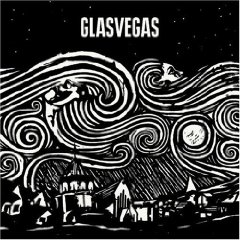Much of the hyperbole precededing Glasvegas’ eponymous debut has emanated from former Creation Records supremo Alan McGee who, in feverish blog posts, seems to herald the Clydeside fourpiece as the final instalment in a three decade trilogy that began with the Jesus & Mary Chain in the 1980s, and continued through Oasis in the 1990s. There’s no faulting the passion with which McGee (and other loyal fans in the media) have put their argument, but could the truth actually be that Glasvegas may rise above even those two great monoliths of indie: more musically nuanced than the Mary Chain, smarter and sweeter than Oasis?
For where the brothers Reid buried their joyous pop (and lack of technical ability) underneath scabrous feedback and sneering attitude, Glasvegas’ mournful exuberance dominates the distortion. The guitars are mixed down in the brew, fluid and shimmering rather than dominating like motorbikes rampaging across a country meadow. This allows, as in the best Phil Spector tradition, the drums, cymbals and occasional tambourine to propel melody as much as rhythm, and raises James Allan’s emotive, heavily accented vocals to the fore. In short, Glasvegas is, more than anything else, an effortlessly pop album.
What’s doubly fascinating about Glasvegas is their flirtation with a vein of music that feels masculine and appealing to the everyman without coming across as boorish. Such is the dark cultural hegemony that Oasis and 1990s’ Loaded laddism have cast over the intervening years that even that Arctic Monkeys haven’t managed to free their loud guitars and observational lyricism from beer-slop, arms-around-your-mates mundanity. Even worse, from The Enemy to The View, Courteeners and The Pigeon Detectives, we’re currently under siege from Oasis’ heirs, groups of doltish lads who supposedly sing snapshots of modern Britain, but are in fact incapable of the most inept scrawl. They all ought to be sat down, played Glasvegas, and forced to think on the consequences of their actions.
For Glasvegas is made up of ten beautifully executed vignettes on modern life. ‘Geraldine’ celebrates a social worker who sits like “the angel on your shoulder”, while ‘Flowers And Football Tops’ concerns a mother’s loss after the death of her son at the hands of a hooligan. Glasvegas explore the pitfalls of modern romance with such eloquence, too. While their young contemporaries write like awkward erections in the school disco, this band are self aware: “It’s all about going out and getting pissed with eagle eyes / and sincerity bottom on my list” sings Allan on ‘It’s My Own Cheating Heart That Makes Me Cry’. Even fighting back at bullies (‘Go Square Go’) or absent fathers (’Daddy’s Gone’) are dealt with in unsurpassed sensitivity. ‘Go Square Go’ ends with the repeated refrain “here we, here we, here we fucking go” over a pugnacious beat and guitar scree with not a hint of braggadocio. Just try to imagine that working from the roaring gullet of Liam Gallagher.
The only gripe comes in ‘Stabbed’, where dark piano and spoken word lyricism about fate and a violent end to an evening could have seethed with subtle power… if only it wasn’t simply borrowing Beethoven’s ‘Moonlight Sonata’, surely the ‘Wild Thing’ of classical music. Nevertheless, this minor slip-up aside, Glasvegas is that rarest of beasts – a debut record that arrives on a raft of hype, but actually delivers the goods to the far bank. With the country sliding into recession and the outlook bleak, Glasvegas make exactly the sort of music we need right now – realist yet escapist, substantial pop. They deserve every bit of praise that’s been thrown at them, and then some.


